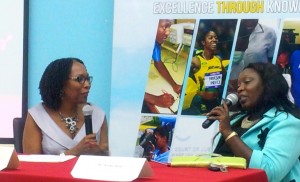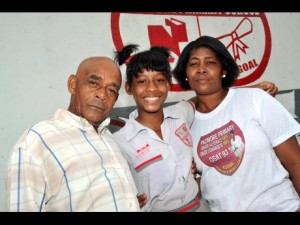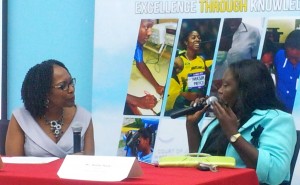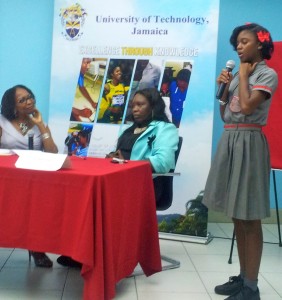
Padmore Primary School: A Love Story
September 30th, 2015
“I was a likkle tomboy,” says Ms. Keisha Hayle, with a wry smile. “I gave a little talk.”
Ms. Hayle is talking about her school days, on a warm September evening at the University of Technology (UTech). Now, Ms. Hayle’s tomboy days are long past, and she has taken on the responsibility of a school herself. Yet, it is more than a simple responsibility; it is a personal sacrifice, and (literally) a labor of love.

Professor Rosalea Hamilton (left) in conversation with Keisha Hayle, Principal of Padmore Primary School at the University of Technology last Friday evening. (My photo)
The occasion was a “Conversation with Keisha Hayle” at UTech. Professor Rosalea Hamilton conducted the conversation, and members of the audience (including several women involved in civil society, educators, family members and students) joined in from time to time. This was one of a series of network events, under the Women for Empowerment initiative begun by the Professor that provides opportunities to discuss, support and find ways forward among Jamaican women. The discussion also came under the umbrella of UTech’s Division of Community Service and Development project, Fi Wi Jamaica, which is funded by USAID.
Keisha Hayle is Principal of Padmore Primary School, a small school in a remote and hilly St. Andrew district. What is so special about Padmore Primary? Well, simply that it rose from the bottom (the lowest-graded “failing school” in Jamaica in 2011) to the top-performing school in 2014/15, with 100 per cent passes in the G-SAT examinations. This was an extraordinary achievement, driven by the iron will and determination of just one woman.
Ms. Hayle speaks in a low voice. At first, it seems she does not know where to start on the story of Padmore Primary, which she single-handedly rescued from closure. Professor Hamilton nudges her forward, and she warms to the task. She tells us a little about her own background; she grew up in Waltham Park Road and East Kirkland Heights, the fourth of five children – humble beginnings, as they say. After passing her CXC examinations at Meadowbrook High School, Ms. Hayle started tutoring at children’s homes, and worked at Red Hills Primary School as a temporary teacher. The Principal “did not let me go,” she says. She stayed there for ten years.
Ms. Hayle takes one of several deep breaths during her narrative. She was troubled to observe the impact of sheer poverty on her students: low self-esteem, behavioral problems, poor motivation, learning difficulties. It broke her heart. After taking her Masters at The Mico University in 2009 as a literacy specialist, she was determined to take the children forward. She pushed them. Over the years, she took many students home after school to tutor and mentor them; her mother, who was in the audience, smiled broadly when Ms. Hayle said she had to put up with a great deal at home – children everywhere. “I wanted them to read – quickly,” said Ms. Hayle. She is never one to hesitate, it seems. Her voice grows clearer. It’s clear she likes to get on with things.
Then a couple of things happened that changed her life: She had a minor stroke. Her heart actually stopped beating, but as Ms. Hayle puts it, “I died and came back.” The near-death experience brought home to her the importance of others’ support; her sisters cared for her.
Not long afterwards, the Principal of Padmore Primary School resigned. The National Education Inspectorate had visited and gave the school a failing grade. When Ms. Hayle was appointed as Principal – basically to oversee the school’s closure – parents were taking their children away (there were 38 students at the time) and sending them by bus and taxi, to larger primary schools further away. But Ms. Hayle saw the school’s potential. She decided to “set about proving the Ministry of Education wrong” after Padmore had been written off. She “rebranded” the school – new uniforms in red and grey, and a school crest. She organized workshops for the teachers. She made the school, and the teachers, feel important again. They did not close.

The students line up to get on their brand new bus, which the school won in a Toyota competition last year.
Ms. Hayle’s voice became more urgent. An important priority was to get the community to believe in the school again, but at first she had little support: “Nobody wants to be attached to failure.” However, she kept community members engaged, got them involved. Assistant Commissioner of Police Novelette Grant, an audience member, commended Ms. Hayle: “You pulled the community along with you.”
Nevertheless, lack of funding has been a problem from the start; the Ministry of Education subvention is very small. Ms. Hayle sold the house she inherited from her uncle so that she could buy a school bus; there were only “robot” taxis in the area for the students. The bus broke down, and repairs were costly. So she and the teachers entered a competition, for which the prize was a bus. They won. She knew the children were hungry, so she cooked porridge for them every day. She still often has to use her own personal funds to keep things going.
By now we are understanding what drives Ms. Hayle to continue with her work: It is, simply put, love. A Padmore student spoke. “Ms. Hayle helped me in ways no one else could,” she said, tears brimming in her eyes. “She is always there. She doesn’t give up on me.” Ms. Hayle particularly worries about the girls, afraid they will “fall by the wayside.” As ACP Novelette Grant notes, “At risk youth are not necessarily engaging in risky behaviors. They are simply vulnerable.”
“I like a good argument…and I like to write,” says Ms. Hayle with a flash of humor. As a principal, she is very hands-on. “I mother my classes,” she confesses. The teaching and learning experience is growing richer, she adds, pointing to her strong relationships with her teaching staff.

Moving up: Danielle Dunbar (centre) poses with her parents, Conrad and Marlene Dunbar, after the Padmore Primary School student received her Grade Six Achievement Test results this year. Danielle is now attending Campion High School. (Photo: Norman Grindley/Gleaner)
The Keisha Hayle story is not only one of incredible resilience and willpower; it is a tale of compassion. As a woman who herself knows what it was like to be teased at school because her uniform wasn’t quite right, Ms. Hayle knows what it is like to be poor. She becomes tearful when she recalls noticing one student, who had a big hole in the sole of her shoe and was trying to hide it.
So where does Padmore Primary go from here? Fund-raising is top of the agenda. This summer, Ms. Hayle sold her own car to raise more money. Head of the Jamaica Civil Society Coalition Carol Narcisse suggests Ms. Hayle try to tap into unused resources. She says she visits many schools where books are still in shrink wrap, and computers stand unused.
Fi Wi Jamaica (“Our Jamaica”) focuses on empowering socially excluded groups, strengthening them through social, cultural and economic support and encouraging advocacy among these groups that will lead to a more confident, dignified life – free from discrimination and free from violence. Dean and Associate Professor at UTech’s College of Health Sciences Dr. Ellen Campbell-Grizzle gives us an outline of one initiative being supported by the program – the “I am Special” initiative – which is focused on young girls in state care, who are about to leave the institution at age eighteen. The project has many volunteers, she says. Despite being a trained scientist, she is at once excited and moved by Fi Wi Jamaica’s work.“We must always find ways to connect,” says Dr. Grizzle. The all-embracing African concept of “Ubuntu” fits well into the Fi Wi Jamaica philosophy.
I find myself wishing there were many more Keisha Hayles in our education system. She is keen, however, to share her “can do” approach with other schools; she would like the Education Ministry to facilitate her speaking to the heads of other “failed” schools. She considers many school boards are “troublesome” and do not have the children’s best interests at heart.
Does she ever feel like giving it all up, and living a nice quiet life? “Keisha Hayle and failure don’t belong in the same sentence,” says the educator firmly. “Dig in and don’t give up.”
One parent in the audience adds, “Love conquers all.”
If you would like to help Padmore Primary School in any way, please contact them at padmoreprimary@yahoo.com.

Keisha Hayle tells her story, and the story of Padmore Primary, to Professor Rosalea Hamilton. (My photo)
Tags: Carol Narcisse, Ellen Campbell-Grizzle, Fi Wi Jamaica, Jamaica Civil Society Coalition, Keisha Hayle, Ministry of Education, National Education Inspectorate, NGO, Novelette Grant, Padmore Primary School, Rosalea Hamilton, University of Technology, USAID, UTech
The Gleaner reserves the right not to publish comments that may be deemed libelous, derogatory or indecent.
To respond to The Gleaner please use the feedback form.
- We Are the Zoomers
- Living Online with Humans and Birds: NAOC 2020
- Human Trafficking and the Problem of Public Education
- Down Memory Lane
- Are We Ready to Recover from COVID-19?
- Road Safety Matters: Is Your Vehicle Safe?
- Sexual Harassment, Me Too, and the Minister’s Disturbing Giggle
- The Vulnerable Senior Citizens, Private Care Homes and COVID-19
- A Muddle Over Masks
- Here is Something Life-Saving You Can Do: Give Blood!



